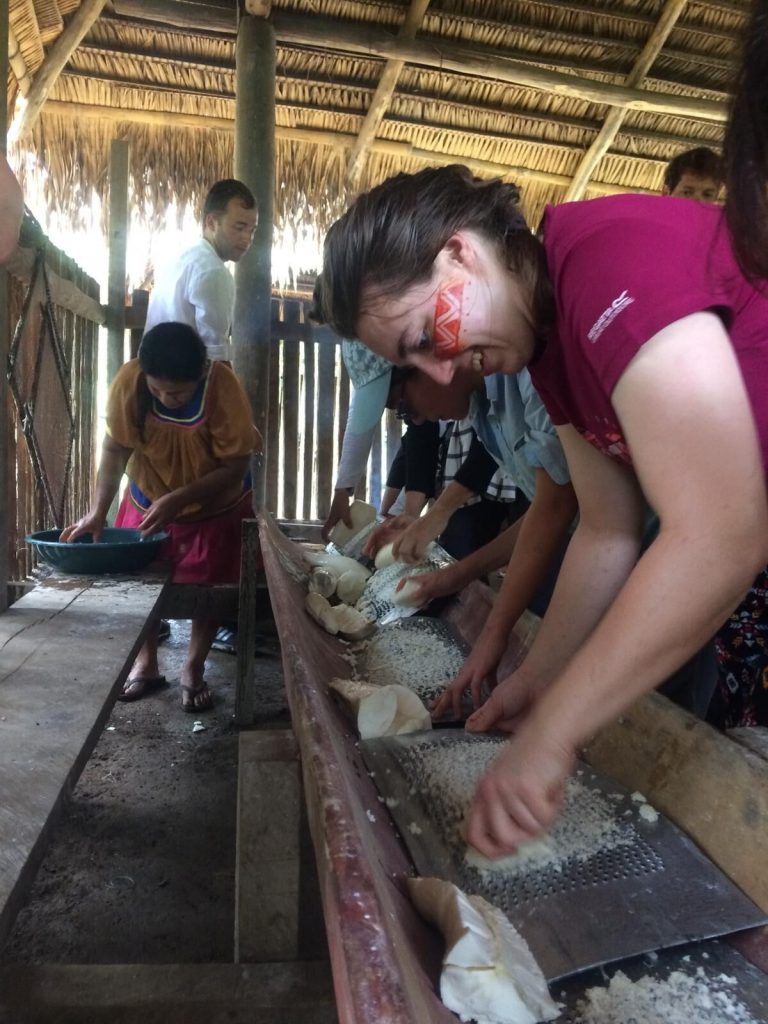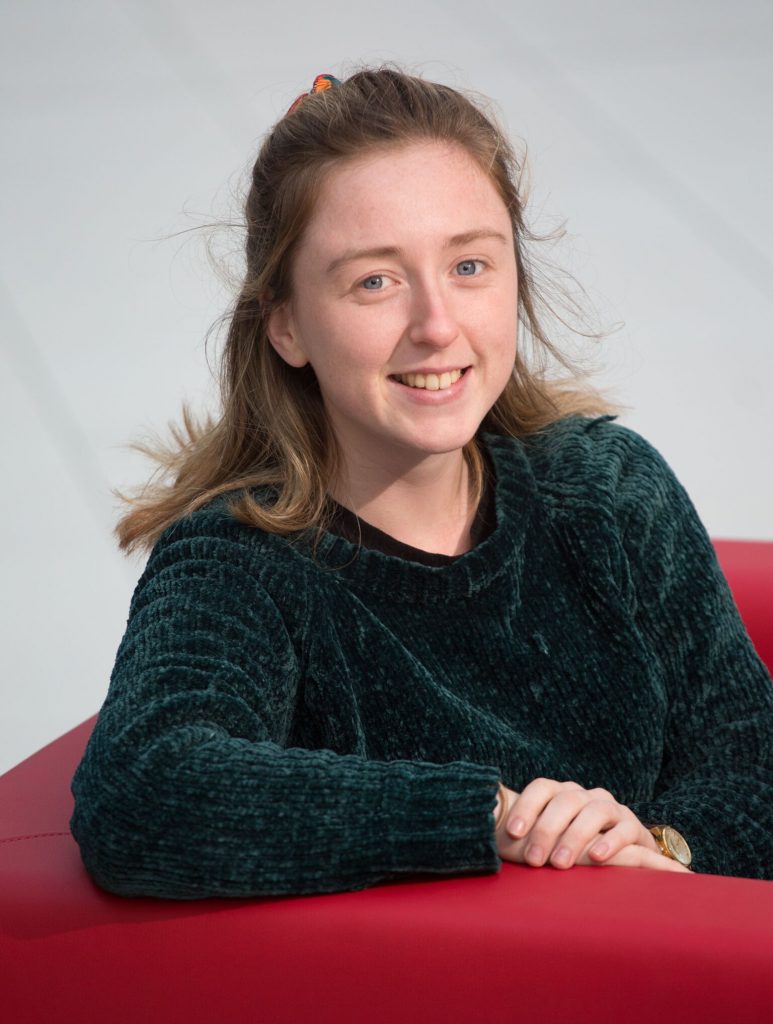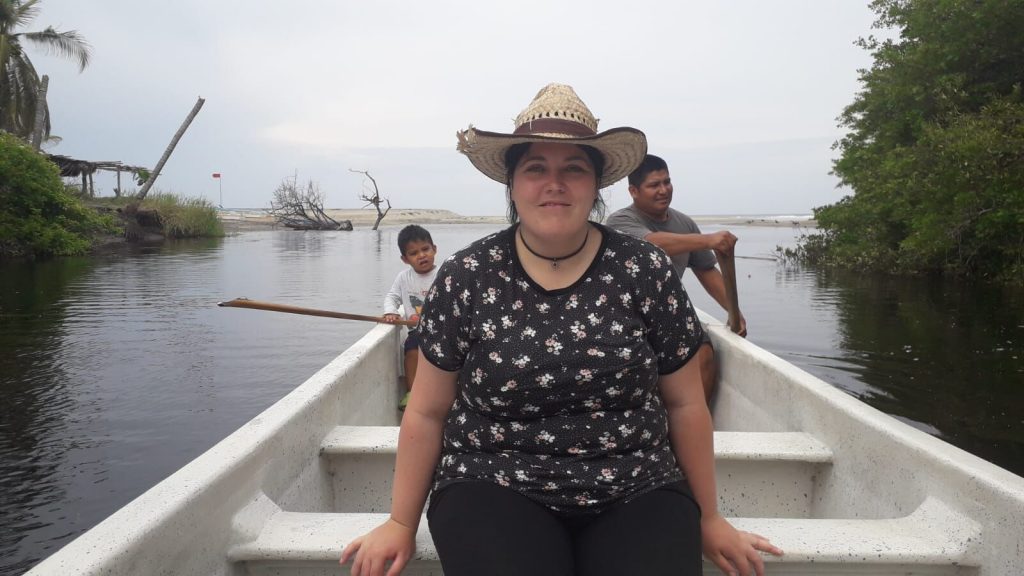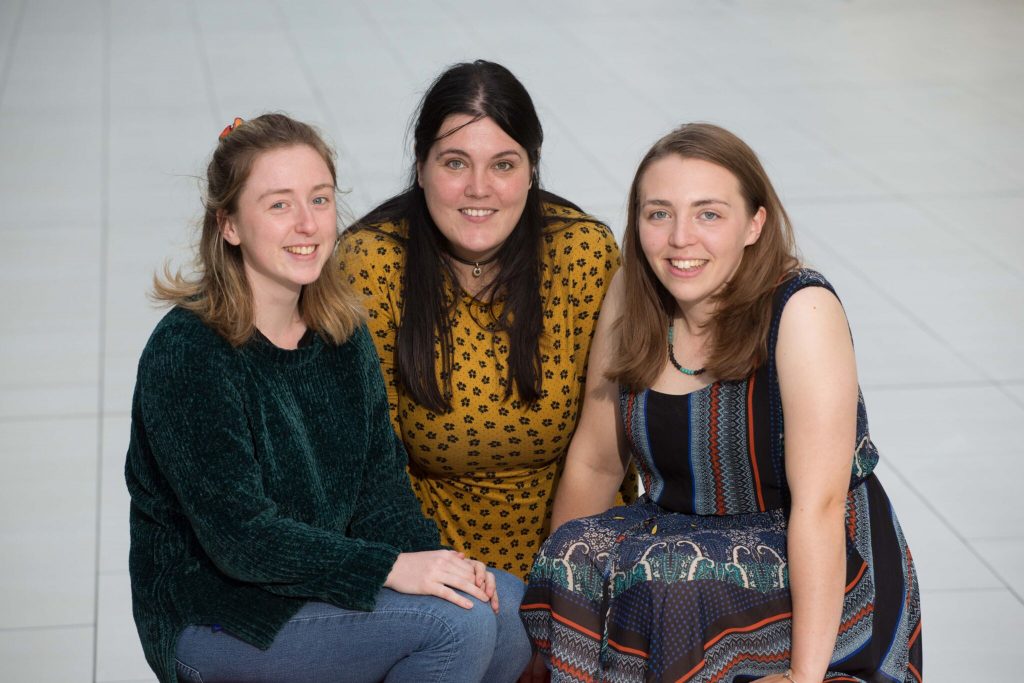By Mark Lynch
Aoife Hughes, Lorraine Flaherty and Gemma Lynch were chosen to take part in volunteering projects in different parts of the world for 2 months, as part of EIL Explore, through the ALIVE programme here at NUI Galway. EIL is an Irish non-profit organisation that provides study abroad, language training, community service and other educational and cultural immersion activities for over 2,500 people annually. The deadline for applicants this coming year is the 5th December, with interviews during study week. For some insight into what you might be in for if you’re selected, here are their stories from their unique adventures, from escaping to the mountains in Vietnam, to crossing crocodile-infested waters on a little canoe, to delving deep into the Amazon rainforest.

Aoife Hughes spent her 8 weeks in Quito, the capital of Ecuador. She informs me Quito is a whopping 2,800 metres above sea level. For context, Ireland’s highest mountain, Carrauntoohil, is 1,038 metres above sea level. “It’s also very hot, with relentless sun. It rained 5 days while I was there and I was there for 8 weeks”. Although the environment and volunteering have always been strong passions of Aoife’s, the actual scholarship wasn’t something she had even known about, before one life-changing evening last year. “Before I applied for it, I didn’t know anything about it. I saw it at the bottom of a student email one Friday and the deadline was the following Tuesday, so I had to get to work”. She does advise that future volunteers are slightly more organised than she was, when it comes to applying.
The process of getting to Ecuador was a long one, starting with an application form, with a volunteering reference required. Next was a short-list by NUI Galway, which she was on, then a short-list by EIL, which she was also on. It’s really only at this point that it’s even decided where the volunteers will end up going for their 2 months, as it’s important to note that each location has a different type of project. “It was very much a dialogue between EIL and the volunteers. They talked to us about our interests and passions, where we thought would suit us and they made their own suggestion as well”. However, even going into that dialogue, Aoife already had her mind made up, she wanted to volunteer on an organic farm in Ecuador. “I went up to them and said how much I wanted to do this project, that I have a farming background, and how amazing the country is and they said, “You’ve really researched this, off you go!”
While research gives you some idea of what to expect when you get there, Aoife maintains there is still room for manoeuvre, “You have a general idea of what it’ll be, but not in terms of exact tasks, which I think is probably better, because if you go over expecting to do this, this, and this and nothing more, then you’re quite rigid and can’t really adapt.
And adapt she did, as she assimilated into this new lifestyle, “When you go somewhere and you’re not a tourist, you’re living there, experiencing it as a local, it really changes how you view the place”. EIL paid for accommodation for the volunteers, which, for Aoife, meant temporary adoption by a family of Colombians in the Ecuadorian capital, “They could teach me about their Colombian heritage, but also about the culture of Quito, so it was a really interesting mix. I’d chat to them about their culture, their experiences, my experiences and how they were similar and different. It was a really useful way to learn”.
Working from 8-4 on the farm, with plenty of physical labour, then learning all about both Colombian and Ecuadorian ways of living in the evenings, was a hectic but rewarding schedule for Aoife and one she’s learned a lot from. Coming back to Ireland, she thinks, “You bring back a heightened sense of compassion for other people and an understanding that, just because someone’s from a different place, doesn’t mean they’re any more or less worthy of your time. It’s not about where you’re from, every person deserves equal treatment”. However, as a student of environmental science, as well as a patron of biodiversity, Aoife is keen to stress the impact that going to Ecuador had on her attitude to the flora and fauna as well as the human aspect. Key to this was her visit to the Amazon during her last few days in South America. “I probably brought back an understanding of the importance of biodiversity, how much we need to protect and why we need to protect. Like, I was on one side of the Amazon and the next week, the other side was on fire. Understanding what we could lose is something I picked up there”.
What would Aoife say to anyone reading this and thinking of applying for themselves? “Do it, don’t have fear. When I told people that I was going to South America for 8 weeks they were all saying how dangerous it would be and then I went over and all I met was the most genuinely kind, open-hearted, amazing people and the most incredible places”. She also has an important message for applicants to go in without judgement, “When you go in with fear, you go with a closed mind and you see what you expect. Walk without fear!”

Gemma Lynch spent 2 months teaching English in Hanoi, the capital of Vietnam. It was quite a logical move for Gemma, whose previous volunteering and teaching experience included mentor programmes with Donegal Youth Council, teaching English at a summer camp in Italy and work experience in primary schools. At the same time, as Gemma put it, this was “a completely new challenge, a completely new experience”. Having lived abroad before, this wasn’t totally new to her, but she still notes the differences, “We were just thrown into it. (We had to) make our own curriculum, teach our own subjects, so it was quite difficult”.
Going in blind also has unique difficulties when you consider that Gemma was teaching the kids a foreign language, “You had to get a feel for what the children were capable of, their level of English. What I found was that there was a big range, even in the one class. One child mightn’t know their colours and another might be having a full conversation”. The range in language level was replicated by the range of ages in her class, 7-12. “It was difficult getting every child’s attention and making sure they receive the same education, but there were 2 of us in the classroom and there were only about 15-20 children, so it wasn’t too bad”. While the children themselves may have provided their own challenge, it was also a challenge to teach with the tools Gemma was given. “There was a normal school and then there was my school, which was basically a community hall. The facilities weren’t great, we had 2 A1 whiteboards, books and crayons, no projector, computer or anything like that”.
Outside of the classroom was where Gemma had most of her adventures. Living in a volunteer house with people of countless nationalities, it was a hotbed of culture compared to what she was used to, “In Ireland, I just didn’t get that experience of dealing with people of different cultures. It was a good mix”. She particularly got on with an American girl, Zayna, who’s Muslim and whose parents hail from Pakistan. They taught twice a day for 4 days during the week, meaning Gemma could spend the weekends exploring Vietnam and in Zayna, she had the perfect travel buddy. “Vietnam is so diverse, like, some weekends we went into the mountains, which were really rural and you had little towns with ethnic tribes, who you’d stay with, in their B&B’s”. Run exclusively by the women of the towns, these trips gave a completely alternative view of Vietnam compared to the hustle and bustle of Hanoi.
They also gave Gemma a break from the pollution, which she says, is a major problem, “It’s tough to deal with. I had to walk to school with a mask every day, because if I didn’t, I’d get a sore throat. In the mornings you could see the smog everywhere”. That said, Gemma is keen to stress it’s not something we can get on our high horse about, “Be mindful that we have the same problems at home with pollution. You’re looking at this beautiful mountain, but then there’s a bag of rubbish on the side of the road. I see that in Donegal too”. The pollution wasn’t the only thing that reminded her of home, while she trekked around the glorious countryside, “When I was travelling up the mountains, I was thinking, this could be Donegal, if it wasn’t 36 degrees right now”.
Having been afforded this opportunity by EIL, Gemma has this advice for any potential applicants, “You need a strong volunteering background, but definitely apply. It’s something different. You might go travelling to Vietnam, but you’re not going to see the culture or the people properly unless you actually live there and immerse yourself. That’s what this programme is about”.

Lorraine Flaherty, a third year zoology student, used to be the type of person who stayed in her comfort zone. During her 8 weeks in the stunning little Mexican village of La Ventanillia, in Oaxaca, not one minute was spent in her comfort zone. She had heard about the programme before, because her friend had taught in Vietnam the previous year and had inspired her to apply. Lorraine says that being an animal lover played an important part in the decision, “My project was very animal-based, I love animals and since I do zoology in college, we talked about it and agreed I’d go to Mexico”.
Lorraine headed for Mexico without speaking a word of Spanish. She was nervous about this at first, although it didn’t hamper her as much as she feared, “I used a lot of action with my hands when talking and it really worked. The girl I was with, Annie, helped translate for me as well, so it was actually fine, we managed”. She also found some of the locals to be particularly helpful, “The kids loved us, they were around us all the time. They all wanted to learn English, so they’d help me with my Spanish and I helped them with their English. They were so patient, I actually found them more helpful than the adults”.
If she was expecting to stay in her comfort zone when she arrived, Lorraine was in for a surprise, “I was told I’d be working with turtles, but I was actually working with crocodiles, which was way better”. I simply had to ask for more detail. “There were researchers there, at the time that we were there, which was very lucky, because we got to weigh the crocodiles and measure them. Then, at night, we’d go out on canoes and we’d have to shine a light out to find their eyes and capture them, it was amazing”.
If you’re thinking that not every day could be that exciting, you’d actually be wrong. Lorraine explained that even getting to work involved an element of danger, “We got up at 7 and then we had to get a little canoe over to the island, through the water that was surrounded by crocodiles, but it only took a few minutes to get across”. When she arrived on the island, Lorraine was also given a surprise about the actual work she was doing, “We were told we’d be working in the kitchen a lot and I barely worked in the kitchen. It was completely different (to what I expected). We were mainly doing manual work, helping to feed the animals, gardening and raking”. However, it seemed even the mundane was transformed into the extraordinary, “We’d be raking and you’d be only about 5 metres away from a giant crocodile, it was very cool. Then, when the researchers came, we got to work with the crocodiles”. Crocodiles weren’t the only animals that Lorraine was able to build a rapport with, “There was this monkey, a spider monkey, who I absolutely fell in love with. I had to make time for this monkey, to talk to him, so that was part of my daily schedule as well, 100%”.
All this said, it’s not a holiday and the eco-tourism cabins, which Lorraine lived in for her stay, exemplify this. Despite a crab infestation and then a snake infestation, as well as the constant presence of fruit bats and insects, she feels the experience has helped her grow, “I think for the first few days, it was crazy, but over time, I got used to it and was able to adjust”. She also had to adjust to new cultures, which was helped by sharing this living space with other people, “I definitely learned a lot about Mexican culture, because the 3 other volunteers – even though their English wasn’t great – we could have Google Translate out and they could explain a lot. We’d tell them about Ireland and they’d tell us about Mexico”. All this, while sat on a peaceful beach, with weekends free to explore nearby villages.
So would Lorraine, who was previously stuck in her comfort zone, recommend diving headfirst into the adventures that the EIL Explore scholarship provides? “My friend helped push me out of that comfort zone and I’m so grateful she did. I’ve done things I never expected to do and my memories of that will be with me forever. I’d love for somebody else to experience that, so just go for it!”
